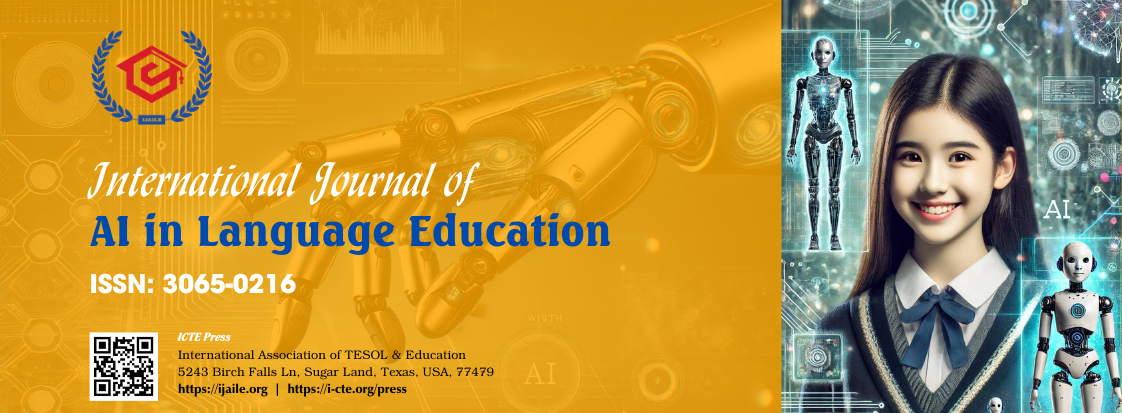The Benefits and Weaknesses of ChatGPT on Students’ Learning Writing
DOI:
https://doi.org/10.54855/ijaile.24112Keywords:
Chat GPT, Artificial Intelligence, Writing LearningAbstract
ChatGPT is seen as an Artificial Intelligence application of OpenAI in the industrial era 4.0. ChatGPT has been identified as possibly being used in a variety of disciplines, including education. Previous research has shown that employing ChatGPT as a learning helper can help students enhance their learner autonomy, research, and scholarship. Furthermore, studies discovered that ChatGPT poses several obstacles to learners, particularly those beginning to write, such as illusions and potential illicit authorship and copyright. Consider that there are few studies conducted in Vietnam on this topic. This study aims to identify the limitations of Chat GPT that people typically encounter when studying writing, particularly in the Research Writing Course, and explore whether Chat GPT helps learners improve writing outcomes. The author discovered qualitative data from interviews with seven Master Course students, indicating that despite the numerous problems that students frequently face when utilizing ChatGPT, this platform can help them improve their writing abilities.
References
Biswas, S. (2023). Role of Chat GPT in Education. Journal of ENT Surgery Research, 1(1), 1-3. Retrieved from https://ssrn.com/abstract=4369981
Bozkurt, A. (2023). Generative artificial intelligence (AI) powered conversational educational. Asian Journal of Distance Education, 18(1), 198-204. https://doi.org/10.5281/zenodo.7716416
Browne, R. (2023). Italy became the first Western country to ban ChatGPT. Here’s what other countries are doing. CNBC. Retrieved from https://www.cnbc.com/2023/04/04/italy-hasbanned-chatgpt-heres-what-other-countries-are-doing. html
Dharani, M., Jyostna, J. V., Sucharitha, E., Likitha, R., & Manne, S. (2020). Interactive Transport Enquiry with AI Chatbot. Proceedings of the International Conference on Intelligent Computing and Control Systems (ICICCS), 1271-1276. https://doi.org/10.1109/ICICCS48265.2020.9120905 DOI: https://doi.org/10.1109/ICICCS48265.2020.9120905
Firat, M. (2023). How ChatGPT Can Transform Autodidactic Experiences and Open Education? ResearchGate. https://doi.org/10.31219/osf.io/9ge8m DOI: https://doi.org/10.31219/osf.io/9ge8m
Firat, M. (2023). What ChatGPT means for universities: Perceptions of scholars and students. Journal of Applied Learning & Teaching, 6(1), 1-7. https://doi.org/10.37074/jalt.2023.6.1.22 DOI: https://doi.org/10.37074/jalt.2023.6.1.22
Fitria, T. N. (2021). Artificial Intelligence (Ai) In Education: Using Ai Tools For Teaching And Learning Process. Proceeding Seminar Nasional & Call For Papers, 4(1), 134-147. Retrieved from https://prosiding.stie-aas.ac.id/index.php/prosenas/article/view/106
Fitria, T. N. (2021). The Use Technology Based On Artificial Intelligence In English Teaching And Learning. ELT Echo : The Journal of English Language Teaching in Foreign Language Context, 6(2), 213-223. DOI: https://doi.org/10.24235/eltecho.v6i2.9299
Fitria, T. N. (2023). Artificial intelligence (AI) technology in OpenAI ChatGPT application: A review of ChatGPT in writing English essay. Journal of English Language Teaching, 12(1), 44-58. doi: https://doi.org/10.15294/elt.v12i1.64069 DOI: https://doi.org/10.15294/elt.v12i1.64069
Ho, P. X. P. (2024). Using ChatGPT in English Language Learning: A Study on I.T. Students’ Attitudes, Habits, and Perceptions. International Journal of TESOL & Education, 4(1), 55-68. https://doi.org/10.54855/ijte.24414 DOI: https://doi.org/10.54855/ijte.24414
Nguyen, T. T. H. (2023). EFL Teachers’ Perspectives toward the Use of ChatGPT in Writing Classes: A Case Study at Van Lang University. International Journal of Language Instruction, 2(3), 1–47. https://doi.org/10.54855/ijli.23231 DOI: https://doi.org/10.54855/ijli.23231
Pham, V. P. H., & Le, A. Q. (2024). ChatGPT in Language Learning: Perspectives from Vietnamese Students in Vietnam and the USA. International Journal of Language Instruction, 3(2), 59–72. https://doi.org/10.54855/ijli.24325 DOI: https://doi.org/10.54855/ijli.24325
Rudolph, J., Tan, S., & Tan, S. (2023). War of the chatbots: Bard, Bing Chat, ChatGPT, Ernie and beyond. The new AI gold rush and its impact on higher education. Journal of Applied Learning & Teaching, 6(1), 1-26. https://doi.org/10.37074/jalt.2023.6.1.23 DOI: https://doi.org/10.37074/jalt.2023.6.1.23
Sallam, M. (2023). ChatGPT utility in health care education, research, and practice: Systematic review on the promising perspectives and valid concerns. Healthcare, 11(6), 887. https://doi.org/10.3390/healthcare11060887 DOI: https://doi.org/10.3390/healthcare11060887
Shidiq, M. (2023). The Use Of Artificial Intelligence-Based Chat-Gpt And Its Challenges For The World Of Education; From The Viewpoint Of The Development Of Creative Writing Skills. Proceeding of International Conference on Education, Society and Humanity, 1(1), 353-357. Retrieved from https://ejournal.unuja.ac.id/index.php/icesh
Wang, B. D. (2023). Chatting about ChatGPT: How may AI and GPT impact academia and libraries? Library Hi Tech News, 40(3), 26-29. https://doi.org/10.1108/LHTN-01-2023-0009 DOI: https://doi.org/10.1108/LHTN-01-2023-0009
Wei, C., Yu, Z., & Fong, S. (2018). How to Build a Chatbot: Chatbot Framework and its Capabilities. Proceedings of the 2018 10th International Conference on Machine Learning and Computing, 369-373. https://doi.org/10.1145/3195106.3195169 DOI: https://doi.org/10.1145/3195106.3195169
Yu, H. (2023). Reflection on whether Chat GPT should be banned by academia from the perspective of education and teaching. Psychol. https://doi.org/10.3389/fpsyg.2023.1181712 DOI: https://doi.org/10.3389/fpsyg.2023.1181712
Zhou, C., Qiu, C., & Acuna, D. E. (2022). Paraphrase Identification with Deep Learning: A Review of Datasets and Methods. arXiv:2212.06933. https://doi.org/10.48550/arXiv.2212.06933
Downloads
Published
Issue
Section
License
Copyright (c) 2024 Su Ai Anh Thu, Tran Thi Hoang Nguyen (Author)

This work is licensed under a Creative Commons Attribution 4.0 International License.












